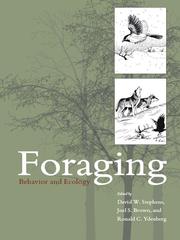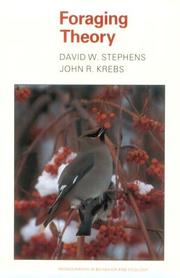| Listing 1 - 5 of 5 |
Sort by
|
Book
ISBN: 0333136225 0333133919 1349154822 Year: 1972 Publisher: London Macmillan
Abstract | Keywords | Export | Availability | Bookmark
 Loading...
Loading...Choose an application
- Reference Manager
- EndNote
- RefWorks (Direct export to RefWorks)
591.13 --- 591.13 Nutrition. Inanition --- Nutrition. Inanition --- Animal nutrition --- Animals --- Animal diets --- Animal feeding behavior --- Animal food --- Animal food habits --- Animal foods --- Animals, Food habits of --- Feeding behavior in animals --- Food habits in animals --- Food of wild animals --- Foraging behavior in animals --- Animal behavior --- Food --- Domestic animals --- Livestock --- Nutrition --- Feeding behavior --- Food habits --- Foods --- Foraging behavior --- Physiology --- Food. --- Nutrition. --- Comparative.
Book
ISBN: 1839698616 1839698608 Year: 2022 Publisher: London, United Kingdom : IntechOpen,
Abstract | Keywords | Export | Availability | Bookmark
 Loading...
Loading...Choose an application
- Reference Manager
- EndNote
- RefWorks (Direct export to RefWorks)
Animals --- Food. --- Animal diets --- Animal feeding behavior --- Animal food --- Animal food habits --- Animal foods --- Animals, Food habits of --- Feeding behavior in animals --- Food habits in animals --- Food of wild animals --- Foraging behavior in animals --- Animal behavior --- Food --- Feeding behavior --- Food habits --- Foods --- Foraging behavior
Book
ISBN: 9086861563 908686712X Year: 2011 Publisher: Wageningen, Netherlands : Wageningen Academic Publishers,
Abstract | Keywords | Export | Availability | Bookmark
 Loading...
Loading...Choose an application
- Reference Manager
- EndNote
- RefWorks (Direct export to RefWorks)
For more than 30 years, modelling has been an important method for integrating, in a flexible, comprehensive and widely applicable way, basic knowledge and biological concepts on digestion and metabolism in farm animals. The purpose of this book is to present the 'state of art' in this area. The chapters are written by leading teams and researchers in this field of study, mainly from Europe, North America and Australasia. Considerable progress has been made in topics dealing with: modelling methods, feeding behaviour, digestion and metabolic processes in ruminants and monogastric animals. This progress is clearly illustrated by the emergence of a new paradigm in animal nutrition, which has moved from the aim to cover the requirements of the animal to explaining and predicting the responses of the animals to diets (e.g., productivity and efficiency, impact on quality of products, environmental aspects, health and well-being). In this book several chapters illustrate that through empirical models, meta-analysis is an efficient tool to synthesize information gathered over recent decades. In addition, compared with other books on modelling farm animal nutrition, two new aspects received particular attention: expanding knowledge of the individual animal to understanding the functioning and management of herds, and the consideration of the environmental impact of animal production. This book is a valuable source of information for researchers, nutritionists, advisors, and graduate students who want to have up-to-date and concise information on mathematical modelling applied to farm animals.
Animal nutrition. --- Digestion --- Computer simulation. --- Life sciences. --- Life Sciences. --- Life Sciences, general. --- Physiology --- Indigestion --- Nutrition --- Animals --- Domestic animals --- Livestock --- Biosciences --- Sciences, Life --- Science --- Food. --- Animal diets --- Animal feeding behavior --- Animal food --- Animal food habits --- Animal foods --- Animals, Food habits of --- Feeding behavior in animals --- Food habits in animals --- Food of wild animals --- Foraging behavior in animals --- Animal behavior --- Food --- Feeding behavior --- Food habits --- Foods --- Foraging behavior

ISBN: 0226772659 1281966568 9786611966560 9780226772653 9780226772639 0226772632 9780226772646 0226772640 9781281966568 6611966560 Year: 2007 Publisher: Chicago University of Chicago Press
Abstract | Keywords | Export | Availability | Bookmark
 Loading...
Loading...Choose an application
- Reference Manager
- EndNote
- RefWorks (Direct export to RefWorks)
Foraging is fundamental to animal survival and reproduction, yet it is much more than a simple matter of finding food; it is a biological imperative. Animals must find and consume resources to succeed, and they make extraordinary efforts to do so. For instance, pythons rarely eat, but when they do, their meals are large-as much as 60 percent larger than their own bodies. The snake's digestive system is normally dormant, but during digestion metabolic rates can increase fortyfold. A python digesting quietly on the forest floor has the metabolic rate of thoroughbred in a dead heat
Animals --- Animal diets --- Animal feeding behavior --- Animal food --- Animal food habits --- Animal foods --- Animals, Food habits of --- Feeding behavior in animals --- Food habits in animals --- Food of wild animals --- Foraging behavior in animals --- Animal behavior --- Food --- Food. --- Feeding behavior --- Food habits --- Foods --- Foraging behavior --- ecology, ecological, behavior, behavioral, evolution, evolutionary, biology, sciences, scientific, biological, imperative, foraging, foragers, cognitive science, anthropology, conservation, economics, neurobiology, technology, cognition, population, community, mammals, amphibians, food, eating, survival, neuroethology, energy storage, social interactions, diversity, dynamics, free distribution, provisioning, animals, wildlife.

ISBN: 0691084424 0691206791 Year: 1986 Publisher: Princeton, N.J.
Abstract | Keywords | Export | Availability | Bookmark
 Loading...
Loading...Choose an application
- Reference Manager
- EndNote
- RefWorks (Direct export to RefWorks)
This account of the current state of foraging theory is also a valuable description of the use of optimality theory in behavioral ecology in general. Organizing and introducing the main research themes in economic analyses of animal feeding behavior, the authors analyze the empirical evidence bearing on foraging models and answer criticisms of optimality modeling. They explain the rationale for applying optimality models to the strategies and mechanics of foraging and present the basic "average-rate maximizing" models and their extensions. The work discusses new directions in foraging research: incorporating incomplete information and risk-sensitive behavior in foraging models; analyzing trade-offs, such as nutrient requirements and the threat of being eaten while foraging; formulating dynamic models; and building constrained optimization models that assume that foragers can use only simple "rules of thumb." As an analysis of these and earlier research developments and as a contribution to debates about the role of theory in evolutionary biology. Foraging Theory will appeal to a wide range of readers, from students to research professionals, in behavioral ecology, population and community ecology, animal behavior, and animal psychology, and especially to those planning empirical tests of foraging models. Annotation Published: September 2014.
Animal ethology and ecology. Sociobiology --- Tiere. --- Animaux --- Animal ecology. --- Animals --- Modell --- Optimierung --- Nahrungserwerb --- ökológia --- Models, Theoretical. --- Food Supply. --- Behavior, Animal. --- Animal diets --- Animal feeding behavior --- Animal food --- Animal food habits --- Animal foods --- Animals, Food habits of --- Feeding behavior in animals --- Food habits in animals --- Food of wild animals --- Foraging behavior in animals --- Animal behavior --- Food --- Animals, Habits and behavior of --- Behavior, Animal --- Ethology --- Animal psychology --- Zoology --- Ethologists --- Psychology, Comparative --- Food control --- Produce trade --- Agriculture --- Food security --- Single cell proteins --- Ecology --- Alimentation. --- Food. --- táplálkozás --- modellek --- Feeding behavior --- Food habits --- Foods --- Foraging behavior --- Behavior --- Animal --- Tiere --- Bildband --- 2017
| Listing 1 - 5 of 5 |
Sort by
|

 Search
Search Feedback
Feedback About UniCat
About UniCat  Help
Help News
News